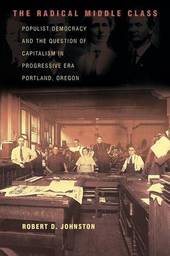
|
The Radical Middle Class: Populist Democracy and the Question of Capitalism in Progressive Era Portland, Oregon
Paperback / softback
Main Details
| Title |
The Radical Middle Class: Populist Democracy and the Question of Capitalism in Progressive Era Portland, Oregon
|
| Authors and Contributors |
By (author) Robert D. Johnston
|
| Series | Politics and Society in Modern America |
|---|
| Physical Properties |
| Format:Paperback / softback | | Pages:424 | | Dimensions(mm): Height 235,Width 152 |
|
| ISBN/Barcode |
9780691126005
|
| Classifications | Dewey:305.550979549 |
|---|
| Audience | | Professional & Vocational | | Tertiary Education (US: College) | |
|---|
| Illustrations |
12 Maps
|
|
Publishing Details |
| Publisher |
Princeton University Press
|
| Imprint |
Princeton University Press
|
| Publication Date |
19 February 2006 |
| Publication Country |
United States
|
Description
America has a long tradition of middle-class radicalism, albeit one that intellectual orthodoxy has tended to obscure. The Radical Middle Class seeks to uncover the democratic, populist, and even anticapitalist legacy of the middle class. By examining in particular the independent small business sector or petite bourgeoisie, using Progressive Era Portland, Oregon, as a case study, Robert Johnston shows that class still matters in America. But it matters only if the politics and culture of the leading player in affairs of class, the middle class, is dramatically reconceived. This book is a powerful combination of intellectual, business, labor, medical, and, above all, political history. Its author also humanizes the middle class by describing the lives of four small business owners: Harry Lane, Will Daly, William U'Ren, and Lora Little. Lane was Portland's reform mayor before becoming one of only six senators to vote against U.S. entry into World War I. Daly was Oregon's most prominent labor leader and a onetime Socialist. U'Ren was the national architect of the direct democracy movement. Little was a leading antivaccinationist. The Radical Middle Class further explores the Portland Ku Klux Klan and concludes with a national overview of the American middle class from the Progressive Era to the present. With its engaging narrative, conceptual richness, and daring argumentation, it will be welcomed by all who understand that reexamining the middle class can yield not only better scholarship but firmer grounds for democratic hope.
Author Biography
Robert D. Johnston is Director of the Teaching of History Program at the University of Illinois at Chicago.
ReviewsWinner of the 2002 President's Book Award, Social Science History Association "[A] magnificent work of political and historical reconstruction... The excitement of this book lies in its engaging combination of passion and rigor."--Jeffrey Sklansky, Reviews in American History The Radical Middle Class credits the lower middle class with providing the leadership and grassroots support for a variety of reform and even radical measures that animated politics in Portland, Oregon during the first quarter of the twentieth century... Johnston has presented scholars with another template of reform that needs to be taken seriously and applied elsewhere."--John F. Reynolds, H-SHGAP "If progressives are to enjoy any success rebuilding a democratic populism that questions a corporate political economy, Johnston's book might suggest some useful (and hopeful) perspectives."--Ken Fones-Wolf, Enterprise & Society "[An] extraordinarily ambitious work... Sure to spark debate, this book is a fine example of the renaissance in political history."--Ron Formisano, Journal of Southern History "[F]ew interested in the history of American social movements, the political role of the middle class, or the contemporary revival of populist politics will fail to find this book insightful and provocative."--Daniel Geary, Labor: Studies in Working-Class History of the Americas "[An] exhaustive and illuminating critique of the historiography of the petit bourgeoisie... Robert D. Johnston has convinced this reviewer that we need to know much more about this crucial middling group and the impact it has had, and continues to have, on U.S. politics as both a local and national force. Historians need to take the lead this book provides."--Adam J. Hodges, H-Net Reviews
|